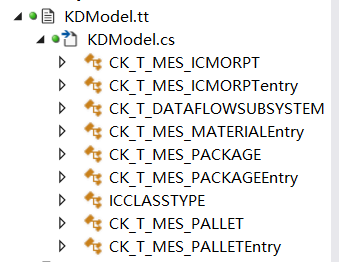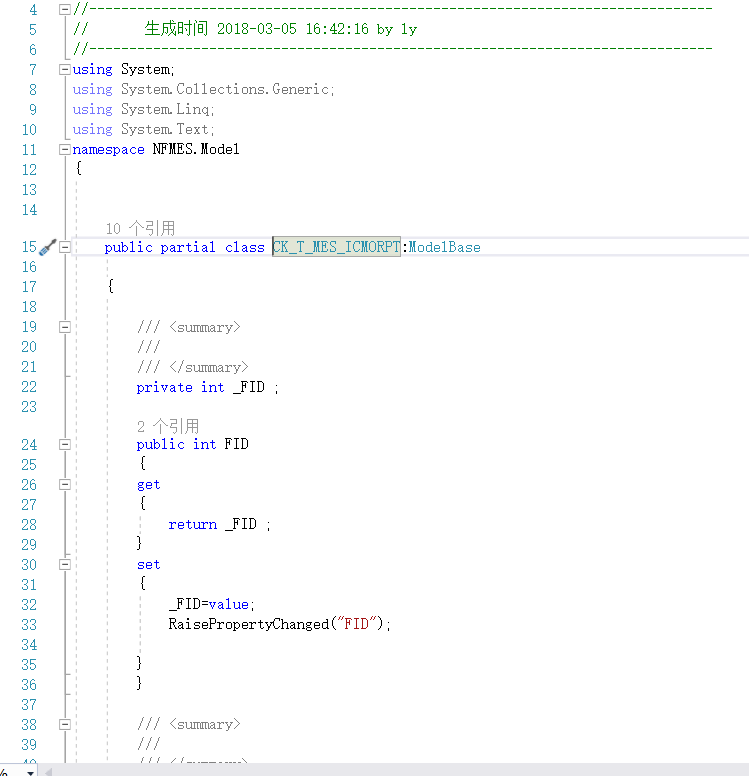我们在用ORM(比如dapper)的时候,很多时候都需要自己写Model层(当然也有很多orm框架自带了这种功能,比如ef),特别是表里字段比较多的时候,一个Model要写半天,而且Model如果用于MVVM中,我们还需要添加PropertyChanged触发代码。发现t4模板可以自动生成代码,于是就写了一个。这个t4模板文件用了很久了,分享下。
<#@ template debug="false" hostspecific="false" language="C#" #> <#@ output extension=".cs" #> <#@ assembly name="System.Core.dll" #> <#@ assembly name="System.Data.dll" #> <#@ assembly name="System.Data.DataSetExtensions.dll" #> <#@ assembly name="System.Xml.dll" #> <#@ import namespace="System" #> <#@ import namespace="System.Xml" #> <#@ import namespace="System.Linq" #> <#@ import namespace="System.Data" #> <#@ import namespace="System.Data.SqlClient" #> <#@ import namespace="System.Collections.Generic" #> <#@ import namespace="System.IO" #> <#@ include file="DbHelper.ttinclude" #> //------------------------------------------------------------------------------ // 生成时间 <#=DateTime.Now.ToString("yyyy-MM-dd HH:mm:ss")#> by ly //------------------------------------------------------------------------------ using System; using System.Collections.Generic; using System.Linq; using System.Text; namespace NFMES.Model { <# string tables="CK_T_Template,CK_T_MES_MV,CK_T_MES_RPT,CK_T_MES_ROUNTINGS"; string[] ts=tables.Split(new char[]{','}); for (int i=0;i<ts.Length;i++) { string tableName=ts[i]; #> public partial class <#= tableName #>:ModelBase { <# foreach(DbColumn column in DbHelper.GetDbColumns(config.ConnectionString, config.DbDatabase, tableName)){#> /// <summary> /// <#=column.Remark#> /// </summary> private <#= column.CSharpType#><# if(column.CommonType.IsValueType && column.IsNullable){#>?<#}#> _<#=column.ColumnName#> ; public <#= column.CSharpType#><# if(column.CommonType.IsValueType && column.IsNullable){#>?<#}#> <#=column.ColumnName#> { get { return _<#=column.ColumnName#> ; } set { _<#=column.ColumnName#>=value; RaisePropertyChanged("<#=column.ColumnName#>"); } } <#}#> } <# } #> } <#+ public class config { public static readonly string ConnectionString="Data Source=192.168.1.135;Initial Catalog=dbname;User ID=sa;pwd=xxx"; public static readonly string DbDatabase="dbname"; } #>
从代码里可以看出,我们在每个生成的属性里,都添加了 RaisePropertyChanged("<#=column.ColumnName#>"),这样生成的Model也可以自动触发PropertyChanged事件了。
这一行 string tables="CK_T_Template,CK_T_MES_MV,CK_T_MES_RPT,CK_T_MES_ROUNTINGS"对应于数据库中的表名,你想将哪个表转化成Model,就将表名写这,保存下就会自动生成一个与表名一样的类。
这个t4模板引用了一个ttinclude文件,这个文件主要处理,根据表名从数据库获取表结构,字段类型等。

<#@ template debug="false" hostspecific="false" language="C#" #> <#@ assembly name="System.Core.dll" #> <#@ assembly name="System.Data.dll" #> <#@ assembly name="System.Data.DataSetExtensions.dll" #> <#@ assembly name="System.Xml.dll" #> <#@ import namespace="System" #> <#@ import namespace="System.Xml" #> <#@ import namespace="System.Linq" #> <#@ import namespace="System.Data" #> <#@ import namespace="System.Data.SqlClient" #> <#@ import namespace="System.Collections.Generic" #> <#@ import namespace="System.IO" #> <#@ output extension=".txt" #> <#+ public class DbHelper { #region GetDbTables public static List<DbTable> GetDbTables(string connectionString, string database) { string tables=""; #region SQL string sql = string.Format(@"SELECT obj.name tablename, schem.name schemname, idx.rows, CAST ( CASE WHEN (SELECT COUNT(1) FROM sys.indexes WHERE object_id= obj.OBJECT_ID AND is_primary_key=1) >=1 THEN 1 ELSE 0 END AS BIT) HasPrimaryKey from {0}.sys.objects obj inner join {0}.dbo.sysindexes idx on obj.object_id=idx.id and idx.indid<=1 INNER JOIN {0}.sys.schemas schem ON obj.schema_id=schem.schema_id where type='U' {1} order by obj.name", database, tables); #endregion DataTable dt = GetDataTable(connectionString, sql); return dt.Rows.Cast<DataRow>().Select(row => new DbTable { TableName = row.Field<string>("tablename"), SchemaName = row.Field<string>("schemname"), Rows = row.Field<int>("rows"), HasPrimaryKey = row.Field<bool>("HasPrimaryKey") }).ToList(); } #endregion #region GetDbColumns public static List<DbColumn> GetDbColumns(string connectionString, string database, string tableName, string schema = "dbo") { #region SQL string sql = string.Format(@" WITH indexCTE AS ( SELECT ic.column_id, ic.index_column_id, ic.object_id FROM {0}.sys.indexes idx INNER JOIN {0}.sys.index_columns ic ON idx.index_id = ic.index_id AND idx.object_id = ic.object_id WHERE idx.object_id =OBJECT_ID(@tableName) AND idx.is_primary_key=1 ) select colm.column_id ColumnID, CAST(CASE WHEN indexCTE.column_id IS NULL THEN 0 ELSE 1 END AS BIT) IsPrimaryKey, colm.name ColumnName, systype.name ColumnType, colm.is_identity IsIdentity, colm.is_nullable IsNullable, cast(colm.max_length as int) ByteLength, ( case when systype.name='nvarchar' and colm.max_length>0 then colm.max_length/2 when systype.name='nchar' and colm.max_length>0 then colm.max_length/2 when systype.name='ntext' and colm.max_length>0 then colm.max_length/2 else colm.max_length end ) CharLength, cast(colm.precision as int) Precision, cast(colm.scale as int) Scale, prop.value Remark from {0}.sys.columns colm inner join {0}.sys.types systype on colm.system_type_id=systype.system_type_id and colm.user_type_id=systype.user_type_id left join {0}.sys.extended_properties prop on colm.object_id=prop.major_id and colm.column_id=prop.minor_id LEFT JOIN indexCTE ON colm.column_id=indexCTE.column_id AND colm.object_id=indexCTE.object_id where colm.object_id=OBJECT_ID(@tableName) order by colm.column_id", database); #endregion SqlParameter param = new SqlParameter("@tableName", SqlDbType.NVarChar, 100) { Value = string.Format("{0}.{1}.{2}", database, schema, tableName) }; DataTable dt = GetDataTable(connectionString, sql, param); return dt.Rows.Cast<DataRow>().Select(row => new DbColumn() { ColumnID = row.Field<int>("ColumnID"), IsPrimaryKey = row.Field<bool>("IsPrimaryKey"), ColumnName = row.Field<string>("ColumnName"), ColumnType = row.Field<string>("ColumnType"), IsIdentity = row.Field<bool>("IsIdentity"), IsNullable = row.Field<bool>("IsNullable"), ByteLength = row.Field<int>("ByteLength"), CharLength = row.Field<int>("CharLength"), Scale = row.Field<int>("Scale"), Remark = row["Remark"].ToString() }).ToList(); } #endregion #region GetDataTable public static DataTable GetDataTable(string connectionString, string commandText, params SqlParameter[] parms) { using (SqlConnection connection = new SqlConnection(connectionString)) { SqlCommand command = connection.CreateCommand(); command.CommandText = commandText; command.Parameters.AddRange(parms); SqlDataAdapter adapter = new SqlDataAdapter(command); DataTable dt = new DataTable(); adapter.Fill(dt); return dt; } } #endregion } #region DbTable /// <summary> /// 表结构 /// </summary> public sealed class DbTable { /// <summary> /// 表名称 /// </summary> public string TableName { get; set; } /// <summary> /// 表的架构 /// </summary> public string SchemaName { get; set; } /// <summary> /// 表的记录数 /// </summary> public int Rows { get; set; } /// <summary> /// 是否含有主键 /// </summary> public bool HasPrimaryKey { get; set; } } #endregion #region DbColumn /// <summary> /// 表字段结构 /// </summary> public sealed class DbColumn { /// <summary> /// 字段ID /// </summary> public int ColumnID { get; set; } /// <summary> /// 是否主键 /// </summary> public bool IsPrimaryKey { get; set; } /// <summary> /// 字段名称 /// </summary> public string ColumnName { get; set; } /// <summary> /// 字段类型 /// </summary> public string ColumnType { get; set; } /// <summary> /// 数据库类型对应的C#类型 /// </summary> public string CSharpType { get { return SqlServerDbTypeMap.MapCsharpType(ColumnType); } } public string DbType { get { return SqlServerDbTypeMap.MapDBType(ColumnType); } } /// <summary> /// /// </summary> public Type CommonType { get { return SqlServerDbTypeMap.MapCommonType(ColumnType); } } /// <summary> /// 字节长度 /// </summary> public int ByteLength { get; set; } /// <summary> /// 字符长度 /// </summary> public int CharLength { get; set; } /// <summary> /// 小数位 /// </summary> public int Scale { get; set; } /// <summary> /// 是否自增列 /// </summary> public bool IsIdentity { get; set; } /// <summary> /// 是否允许空 /// </summary> public bool IsNullable { get; set; } /// <summary> /// 描述 /// </summary> public string Remark { get; set; } } #endregion #region SqlServerDbTypeMap public class SqlServerDbTypeMap { public static string MapCsharpType(string dbtype) { if (string.IsNullOrEmpty(dbtype)) return dbtype; dbtype = dbtype.ToLower(); string csharpType = "object"; switch (dbtype) { case "bigint": csharpType = "long"; break; case "binary": csharpType = "byte[]"; break; case "bit": csharpType = "bool"; break; case "char": csharpType = "string"; break; case "date": csharpType = "DateTime"; break; case "datetime": csharpType = "DateTime"; break; case "datetime2": csharpType = "DateTime"; break; case "datetimeoffset": csharpType = "DateTimeOffset"; break; case "decimal": csharpType = "decimal"; break; case "float": csharpType = "double"; break; case "image": csharpType = "byte[]"; break; case "int": csharpType = "int"; break; case "money": csharpType = "decimal"; break; case "nchar": csharpType = "string"; break; case "ntext": csharpType = "string"; break; case "numeric": csharpType = "decimal"; break; case "nvarchar": csharpType = "string"; break; case "real": csharpType = "Single"; break; case "smalldatetime": csharpType = "DateTime"; break; case "smallint": csharpType = "short"; break; case "smallmoney": csharpType = "decimal"; break; case "sql_variant": csharpType = "object"; break; case "sysname": csharpType = "object"; break; case "text": csharpType = "string"; break; case "time": csharpType = "TimeSpan"; break; case "timestamp": csharpType = "byte[]"; break; case "tinyint": csharpType = "byte"; break; case "uniqueidentifier": csharpType = "Guid"; break; case "varbinary": csharpType = "byte[]"; break; case "varchar": csharpType = "string"; break; case "xml": csharpType = "string"; break; default: csharpType = "object"; break; } return csharpType; } public static string MapDBType(string dbtype) { if (string.IsNullOrEmpty(dbtype)) return dbtype; dbtype = dbtype.ToLower(); string csharpType = "object"; switch (dbtype) { case "bigint": csharpType = "DbType.Int64"; break; case "binary": csharpType = "DbType.Binary"; break; case "bit": csharpType = "DbType.Boolean"; break; case "char": csharpType = "DbType.String"; break; case "date": csharpType = "DbType.DateTime"; break; case "datetime": csharpType = "DbType.DateTime"; break; case "datetime2": csharpType = "DbType.DateTime2"; break; case "datetimeoffset": csharpType = "DbType.DateTimeOffset"; break; case "decimal": csharpType = "DbType.Decimal"; break; case "float": csharpType = "DbType.Double"; break; case "image": csharpType = "DbType.Binary"; break; case "int": csharpType = "DbType.Int32"; break; case "money": csharpType = "DbType.Currency"; break; case "nchar": csharpType = "DbType.StringFixedLength"; break; case "ntext": csharpType = "DbType.String"; break; case "numeric": csharpType = "DbType.Decimal"; break; case "nvarchar": csharpType = "DbType.String"; break; case "real": csharpType = "DbType.Single"; break; case "smalldatetime": csharpType = "DbType.DateTime"; break; case "smallint": csharpType = "DbType.Int16"; break; case "smallmoney": csharpType = "DbType.Decimal"; break; case "sql_variant": csharpType = "DbType.Object"; break; case "sysname": csharpType = "DbType.Object"; break; case "text": csharpType = "DbType.String"; break; case "time": csharpType = "DbType.DateTime"; break; case "timestamp": csharpType = "DbType.Binary"; break; case "tinyint": csharpType = "DbType.Byte"; break; case "uniqueidentifier": csharpType = "DbType.Guid"; break; case "varbinary": csharpType = "DbType.Binary"; break; case "varchar": csharpType = "DbType.AnsiString"; break; case "xml": csharpType = "DbType.Xml"; break; default: csharpType = "DbType.Object"; break; } return csharpType; } public static Type MapCommonType(string dbtype) { if (string.IsNullOrEmpty(dbtype)) return Type.Missing.GetType(); dbtype = dbtype.ToLower(); Type commonType = typeof(object); switch (dbtype) { case "bigint": commonType = typeof(long); break; case "binary": commonType = typeof(byte[]); break; case "bit": commonType = typeof(bool); break; case "char": commonType = typeof(string); break; case "date": commonType = typeof(DateTime); break; case "datetime": commonType = typeof(DateTime); break; case "datetime2": commonType = typeof(DateTime); break; case "datetimeoffset": commonType = typeof(DateTimeOffset); break; case "decimal": commonType = typeof(decimal); break; case "float": commonType = typeof(double); break; case "image": commonType = typeof(byte[]); break; case "int": commonType = typeof(int); break; case "money": commonType = typeof(decimal); break; case "nchar": commonType = typeof(string); break; case "ntext": commonType = typeof(string); break; case "numeric": commonType = typeof(decimal); break; case "nvarchar": commonType = typeof(string); break; case "real": commonType = typeof(Single); break; case "smalldatetime": commonType = typeof(DateTime); break; case "smallint": commonType = typeof(short); break; case "smallmoney": commonType = typeof(decimal); break; case "sql_variant": commonType = typeof(object); break; case "sysname": commonType = typeof(object); break; case "text": commonType = typeof(string); break; case "time": commonType = typeof(TimeSpan); break; case "timestamp": commonType = typeof(byte[]); break; case "tinyint": commonType = typeof(byte); break; case "uniqueidentifier": commonType = typeof(Guid); break; case "varbinary": commonType = typeof(byte[]); break; case "varchar": commonType = typeof(string); break; case "xml": commonType = typeof(string); break; default: commonType = typeof(object); break; } return commonType; } } #endregion #>
t4文件保存后,会自动生成类文件


这样,我们省去了很多代码量。
